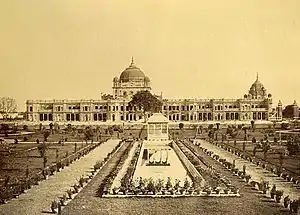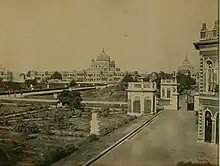Qaisar Bagh

Qaisarbagh Complex of Lucknow, Uttar Pradesh, India (photograph taken between 1865 and 1882).
Qaisarbagh (Hindi: क़ैसरबाग़, Urdu: قيصر باغ, pronounced [qɛːsərˈbaːɣ], Emperor's Garden), also spelled Qaiserbagh, Kaisarbagh or Kaiserbagh, is a complex in the city of Lucknow, located in the Awadh region of India. It was built by Wajid Ali Shah (1847-1856), the last Nawab of Awadh.[1][2] The campaigning Irish journalist William Howard Russell wrote a classic account of the looting of the Qaisar Bagh in 1858 by drunken British troops in the course of the Great Uprising/Indian Mutiny.[3] A kiosk from the Qaisar Bagh gardens was sent to England as a tribute for Queen Victoria and now stands in the Frogmore Gardens at Windsor Castle.[4]
 Qaisarbagh, Lucknow, c.1866 |
 William Howard Russell the London Times correspondent witnesses British soldiers looting Qaisar Bagh, Lucknow, after its recapture in 1858 |
See also
References
- "General View of the Palace in Kaiser Bagh, Lucknow (by H.A. Mirza & Sons)". Images of Asia. 1910. Archived from the original on 5 January 2010. Retrieved 14 August 2009.
- "The Walled Palaces of Kaiserbagh (by Anil Mehrotra Neeta Das)". Zeno Marketing Communications. Inc. Archived from the original on 29 January 2009. Retrieved 14 August 2009.
- Ferdinand Mount, "Atrocity upon atrocity",Times Literary Supplement, 23 February 2018, page 14.
- Historic England. "Kiosk to south east of cottage in Frogmore Grounds (Grade II) (1319306)". National Heritage List for England.
External links
Wikimedia Commons has media related to Qaisar Bagh.
This article is issued from Wikipedia. The text is licensed under Creative Commons - Attribution - Sharealike. Additional terms may apply for the media files.